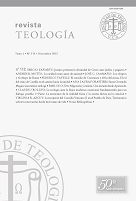Saint Gertrude the Great: A Mystic and a Theologian
Palavras-chave:
existencia teológica, misión teológica, mística dogmática, eclesial y esponsalResumo
St. Gertrude is situated in the turning point when traditional unity between theology and spiritual life is beginning to weaken. Contemporary as she is to the development of scholasticism, she belongs, however, to monastic world, where integration between life and theology is cultivated and defended. Her life is presented before us as one where the theological goal underlying every Christian life is fulfilled: vital understanding of mystery by an experience of intimate communion with the divine. Her teaching illuminates the core of faith from the sources of Liturgy, Revelation and Patristic tradition, assimilated through her spiritual experience. This teaching is expressed in the originality and theological accuracy of her visions and prayers poured into an affective and symbolic language, in the balance of her spiritual doctrine and in her deep ecclesial sense. Her experience constitutes a dogmatic, ecclesial and spousal mystic, whose universality and actuality makes it suitable and attractive both to believers and unbelievers of our days.
Downloads
Downloads
Publicado
Como Citar
Edição
Secção
Licença














 Teología
Teología